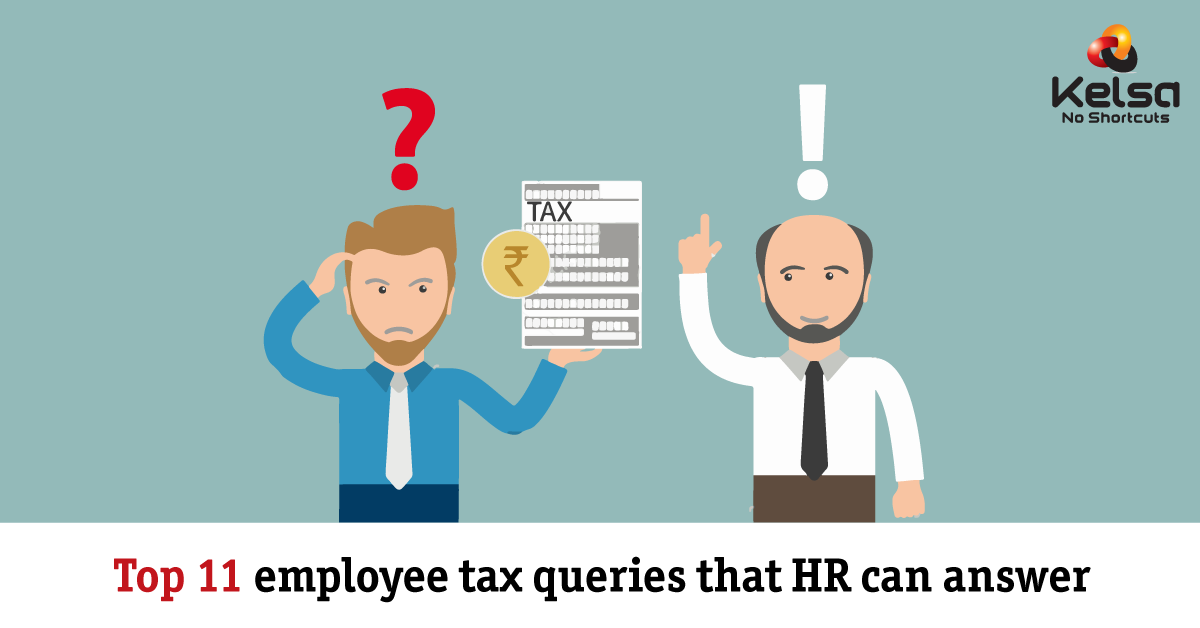Taxation made easy – Top 11 employee tax queries that HR can answer

With less than ten days to go, the tax season is surely and certainly upon all of us!
HR and Payroll teams everywhere are abuzz with activity – as employees throng their offices with tonnes of queries and requests for clarification. And for HR managers it can add up to a lot of work – taking on queries, and explaining processes/ documentation while simultaneously issuing follow-up reminders, verifying tax proofs and managing documentation with accuracy and efficiency.
To make things easy, we ran a quick survey to understand some of the most common tax-related questions that employees ask, and areas where they need education and support. Here is our list of the top 11 areas where employees typically seek tax related information –
Does my employer deduct tax at source while processing my monthly salary?
Yes, to ensure quick and efficient tax processing, most employers deduct taxes (Tax Deducted at Source or TDS) right at the point of generation of income – that is, while paying out the monthly salary to employees. Deducting tax at source of income ensures that the tax amount is directly remitted to the Government and avoids complicated backtracking of salary income figures at the end of the financial year.
What is Form 16 and how can I use it in tax filing?
Form 16 or a TDS certificate gives details of total tax deducted by an employer at the time of paying out the employee salary. As the employer deducts the tax amount on salaries, they are obliged to issue a certificate with details of the tax deducted. The employee can use the Form 16 as proof of TDS on salary income at the time of individual tax filing.
I receive some allowances as part of my salary package, are all of these taxable?
No, not all allowances are taxable – there are some categories of allowances that are non-taxable or partially taxed.
As a rule, allowances that are entitled to tax exemptions (for instance, Meal Allowance, Fixed Medical Allowance, House Rent Allowance) will need to be supported with requisite documents as proof. If an employee fails to submit the relevant documents as proof, tax exemption cannot be provided.
Are there any allowance categories that are fully tax exempt?
Yes, some allowances are fully exempt from taxes. These normally include certain allowance categories paid to government bureaucrats and employees of the United Nations.
My employer makes a monthly contribution to my PF account, is this amount taxable?
Employer contribution to PF is calculated at 12% of basic pay. When the employer’s contribution to PF exceeds Rs. 1.5 Lakhs per annum, the amount is taxable; otherwise, the contribution amount remains tax exempt.
For instance, if the employer PF contribution amount is Rs. 200,000 per annum, the tax will apply as per calculation below.
Rs. 200000 – Rs. 150000 = Rs. 50000
The tax will be applied to the amount of Rs.50000 from the employer PF contribution.
How can I reduce taxes on my salary income?
The PF contribution and allowance amounts (when submitted with proof) offer employees some relief from taxes. However, if additional relief is desired, employees can invest in government savings schemes and subscribe to insurance policies.
Again, documents will need to be shared as requisite proof for the same, with the HR/payroll team.
I had advised my HR/payroll team that I would be investing in additional schemes and insurance policies to avoid tax liability. But I haven’t done so, what would be the implications now?
HR/payroll teams always process tax related inputs by requisite proof documents and only after they have fully verified them. In the event, you have not made these investments or unable to submit relevant documents, they will disregard the information you have previously shared with them and compute tax accordingly.
I have recently bought a property with a home loan – what is the maximum relief that I can be offered towards repayment of principal and interest components of the home loan amount?
As per provisions under Section 80C of the Income Tax Act, amounts paid by an individual towards repayment of principal amount of the home loan is eligible for tax exemption. The maximum limit on the amount is Rs. 1,50,000.
Similarly, Section 24 of the Act allows employees to claim tax deductions up to a maximum of Rs. 2,00,000 towards repayment of the interest component of the home loan.
My spouse and I have jointly invested in a property and availed a home loan for the same. In order to seek tax relief on the same, could we both share the proof of principal and interest repayment with our respective HR/ payroll teams, and avail tax relief simultaneously?
Yes, it is possible for both you and your spouse to share the proof document towards repayment of the principal and interest amounts with your respective HR/ payroll teams.
However, note that since both of you have jointly invested in the property on a 50:50 basis, the tax relief as well will be computed on 50% of the principal and interest amounts that have been paid.
Are payments made towards children’s education fees exempt from taxes?
Yes, Section 80C of the Income Tax Act offers parents tax relief on children’s education fees.
I have worked with two employers through the course of this financial year. How will my tax information be processed by both these employers?
If you have been working with two employers through the course of the financial year, they will each process TDS for the salaries that have been paid to you, and issue a Form 16 respectively.
Taxation made easy – Top 11 employee tax queries that HR can answer

With less than ten days to go, the tax season is surely and certainly upon all of us!
HR and Payroll teams everywhere are abuzz with activity – as employees throng their offices with tonnes of queries and requests for clarification. And for HR managers it can add up to a lot of work – taking on queries, and explaining processes/ documentation while simultaneously issuing follow-up reminders, verifying tax proofs and managing documentation with accuracy and efficiency.
To make things easy, we ran a quick survey to understand some of the most common tax-related questions that employees ask, and areas where they need education and support. Here is our list of the top 11 areas where employees typically seek tax related information –
Does my employer deduct tax at source while processing my monthly salary?
Yes, to ensure quick and efficient tax processing, most employers deduct taxes (Tax Deducted at Source or TDS) right at the point of generation of income – that is, while paying out the monthly salary to employees. Deducting tax at source of income ensures that the tax amount is directly remitted to the Government and avoids complicated backtracking of salary income figures at the end of the financial year.
What is Form 16 and how can I use it in tax filing?
Form 16 or a TDS certificate gives details of total tax deducted by an employer at the time of paying out the employee salary. As the employer deducts the tax amount on salaries, they are obliged to issue a certificate with details of the tax deducted. The employee can use the Form 16 as proof of TDS on salary income at the time of individual tax filing.
I receive some allowances as part of my salary package, are all of these taxable?
No, not all allowances are taxable – there are some categories of allowances that are non-taxable or partially taxed.
As a rule, allowances that are entitled to tax exemptions (for instance, Meal Allowance, Fixed Medical Allowance, House Rent Allowance) will need to be supported with requisite documents as proof. If an employee fails to submit the relevant documents as proof, tax exemption cannot be provided.
Are there any allowance categories that are fully tax exempt?
Yes, some allowances are fully exempt from taxes. These normally include certain allowance categories paid to government bureaucrats and employees of the United Nations.
My employer makes a monthly contribution to my PF account, is this amount taxable?
Employer contribution to PF is calculated at 12% of basic pay. When the employer’s contribution to PF exceeds Rs. 1.5 Lakhs per annum, the amount is taxable; otherwise, the contribution amount remains tax exempt.
For instance, if the employer PF contribution amount is Rs. 200,000 per annum, the tax will apply as per calculation below.
Rs. 200000 – Rs. 150000 = Rs. 50000
The tax will be applied to the amount of Rs.50000 from the employer PF contribution.
How can I reduce taxes on my salary income?
The PF contribution and allowance amounts (when submitted with proof) offer employees some relief from taxes. However, if additional relief is desired, employees can invest in government savings schemes and subscribe to insurance policies.
Again, documents will need to be shared as requisite proof for the same, with the HR/payroll team.
I had advised my HR/payroll team that I would be investing in additional schemes and insurance policies to avoid tax liability. But I haven’t done so, what would be the implications now?
HR/payroll teams always process tax related inputs by requisite proof documents and only after they have fully verified them. In the event, you have not made these investments or unable to submit relevant documents, they will disregard the information you have previously shared with them and compute tax accordingly.
I have recently bought a property with a home loan – what is the maximum relief that I can be offered towards repayment of principal and interest components of the home loan amount?
As per provisions under Section 80C of the Income Tax Act, amounts paid by an individual towards repayment of principal amount of the home loan is eligible for tax exemption. The maximum limit on the amount is Rs. 1,50,000.
Similarly, Section 24 of the Act allows employees to claim tax deductions up to a maximum of Rs. 2,00,000 towards repayment of the interest component of the home loan.
My spouse and I have jointly invested in a property and availed a home loan for the same. In order to seek tax relief on the same, could we both share the proof of principal and interest repayment with our respective HR/ payroll teams, and avail tax relief simultaneously?
Yes, it is possible for both you and your spouse to share the proof document towards repayment of the principal and interest amounts with your respective HR/ payroll teams.
However, note that since both of you have jointly invested in the property on a 50:50 basis, the tax relief as well will be computed on 50% of the principal and interest amounts that have been paid.
Are payments made towards children’s education fees exempt from taxes?
Yes, Section 80C of the Income Tax Act offers parents tax relief on children’s education fees.
I have worked with two employers through the course of this financial year. How will my tax information be processed by both these employers?
If you have been working with two employers through the course of the financial year, they will each process TDS for the salaries that have been paid to you, and issue a Form 16 respectively.




